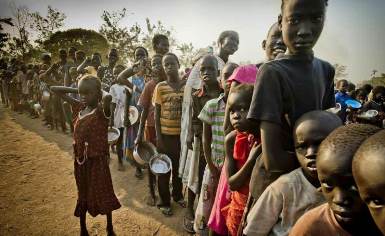South Sudan rebels seek separate relief operations
January 4, 2015 (ADDIS ABABA) – A spokesperson in the office of the former vice-president and leader of the SPLM-In-Opposition, Riek Machar, said the movement was looking forward to an arrangement in which it would directly deal with relief agencies operating in the rebel-controlled areas in South Sudan.

A leading member in the local NGO who spoke on condition of anonymity for fear of security reprisal told Sudan Tribune they were targeted simply because of their ethnicity, maintaining that their organisation was however a neutral relief agency.
“We were detained for three weeks simply because we are from the Nuer ethnic group. When our plane landed in Juba the first thing asked by the security operatives was our ethnic identity,” he said.
The staff member said they were accused of landing at 7.00pm and also working in both government and rebel-held areas, adding all have however been released with strict warning that they should not provide assistance to the populations in the rebel-controlled areas.
The organisation, he said, had been working in Unity state, including the rebel-controlled Leer County, for several years before the current crisis. Leer is the local hometown of the opposition leader Riek Machar.
SEPARATE RELIEF OPERATIONS
The opposition group welcomed the release of the relief workers, but stressed the importance of separating relief operations in the country.
“We seek to deal directly with international, regional and local relief agencies that operate in the liberated areas. This is important so that it eases their access to our areas and make provisions of relief assistances unhindered and effective,” Machar’s spokesman, James Gatdet Dak, told Sudan Tribune on Sunday.
Dak said their humanitarian wing was already engaging with stakeholders to make an arrangement similar to the situation during the 21 years of war between the former guerrilla fighters and the Khartoum government.
“Our humanitarian wing manned by the national committee under the chairmanship of comrade Hussein Mar Nyuot is working hard towards this,” he said.
He said the movement had also established offices in some of the regional countries in order to coordinate with international relief agencies.
“With the civil administration now being established in the liberated areas, the humanitarian wing will be coordinating provision of relief assistance with relief agencies and the civil administration,” he further said.
The opposition leader’s spokesman said the movement would be responsible for identifying affected areas that need immediate relief interventions, sign memoranda of understandings as well as provide pass permits to relief workers.
Before signing of the Comprehensive Peace Agreement (CPA) on 9 January 2005 between the Sudanese government and former rebels led by late John Garang de Mabior, relief agencies used to carry out separate operations in the liberated areas.
The rebel humanitarian offices which were mainly based in Kenya were also responsible for providing pass permits to relief organisations operating in their areas.
(ST)
